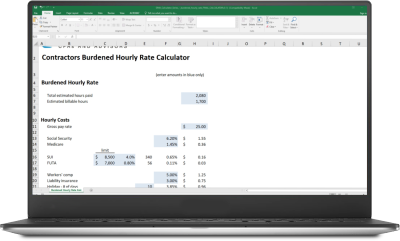There are many reasons why construction contracts lose money, but most relate to botching the contract price during the bid process, and poor project management.
Sometimes contractors aren’t given accurate bid documents up front. This often results in the scope of the project being significantly understated by the company soliciting bids. These price discrepancies are usually fought out with change orders.
For the sake of this article, we will assume that adequate contract specifications are available. Bid failure usually results from estimators and/or project managers not understanding the true total cost of performing their services under the contract.
Understanding Fixed and Variable Costs
Costs of any business fall into two broad categories: fixed and variable. For contractors, fixed costs exist regardless of whether a contract is obtained. Variable costs exist only as a result of a specific contract.
What makes it a bit more complicated is that contract costs, which tend to be predominately variable (generally described as “direct costs”), have some fixed component (generally described as “indirect costs”) as well. Major types of direct costs for contractors include materials, labor, equipment rental and subcontractors, if used.
Examples of indirect costs are automotive expenses, depreciation, rent related to construction activity, general liability insurance, repairs and maintenance, project management labor and training. Examples of general and administrative expenses include office salaries and burden, office rent, phone and internet, marketing and advertising, utilities and perhaps interest and taxes if applicable.
How to Bid a Profitable Job
I often hear frustration from my contractor clients that their employees in charge of bidding on new construction projects do not understand the overhead costs of the business. At the same time, training and tools are not provided to help estimators with bidding. Construction company owners want estimators to recover overhead costs, and even better, make money on the jobs they bid. But owners are often reluctant to provide estimators with the data they need, out of fear of disclosing too much of the company’s financial information.
Overhead is a term that is not always clearly defined or understood. Some think of it as the indirect contract costs only, while others include general and administrative costs as well. However, what needs to be understood is how your contract pricing model is going to cover the total costs of the business plus provide an adequate profit.
When it comes to bidding on contracts, direct costs other than labor are generally not the issue. Due to the labor intensive nature of the construction industry, labor is often the primary cost utilized to recover overhead.
The Benefits of a Labor Overhead Calculator
Gross Mendelsohn offers a labor overhead calculator. This tool checks billing rates for your field personnel. While every business is unique, and models have to be somewhat tailored to your specific context — for example, adjusting for overhead and profit recovered from markups on other direct costs — the labor overhead calculator will help you better understand and assess the rates you are using in light of the total costs of operating your business.
Need Help?
Contact us online or call 800.899.4623.


